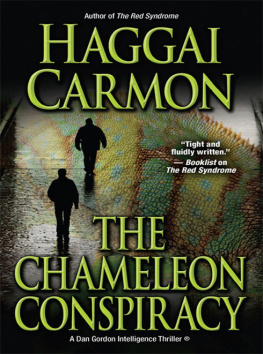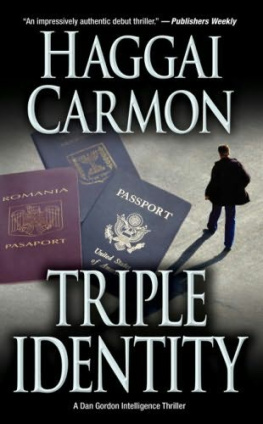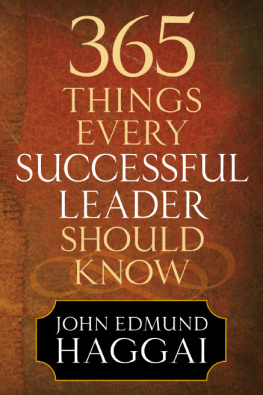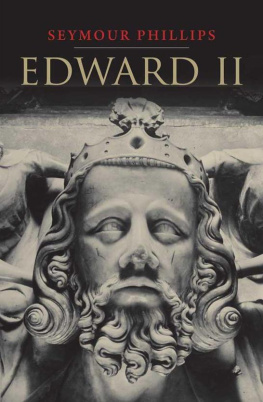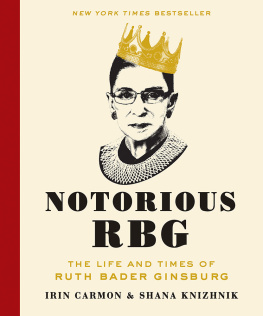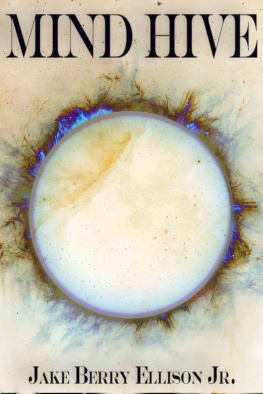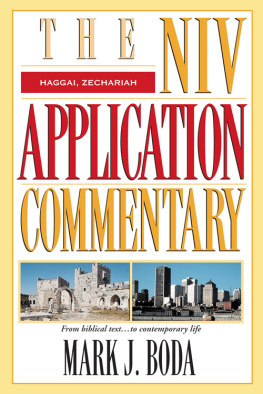I inherited the love of writing from my father, Yehiel Carmon. Like me, he had a day job and a night job. During the day, he was a stern CEO of an Israeli bank. But come evening, he was sequestered in his library, which had a huge collection of books squeezed on wall-to-wall shelves. There, he was glued to his noisy typewriter typing books and articles with two fingers. His library was his shelter from the high-pressure banking world, and there he immersed himself in the mysteries of Far East philosophies and Jewish wisdom. Little wonder that when I turned thirteen, my fathers gift was his first published book, The Decanter and the Goblet.
My intelligence thrillers were inspired by my Israeli professional background, as well as by my twenty years of service for the United States government. Like my father before me, I also had a publicly known daytime activity as well as a nighttime covert activity. Since 1985 I have been representing the United States government in its Israeli civil litigation, appearing in Israeli courts in lawsuits to which the U.S. is a party. But away from the public eye, I was also engaged by the U.S. government to perform intelligence gathering in multimillion-dollar white-collar crime cases that required sensitive undercover work in more than thirty countries. Obviously, in my years working for the U.S. Department of Justice and other federal agencies, I could not share the hair-raising aspects of my work with anyone but my supervisors, and some adventures not even with them. Sadly, these events, which are sometimes more fascinating and breathtaking than the best fiction I have ever read, will never see the light of day. The story of Dan Gordon and his battle against the invisible FOEforces of evilis my idea of the next-best thing.
The Chameleon Conspiracy is the third installment in the Dan Gordon Intelligence Thriller series, preceded by Triple Identity and The Red Syndrome. More thrillers in the series are to follow. In my professional life, first in Israel and then working for the United States government, I have had enough adventures, frequently dangerous, to fill at least ten books, and those are just the ones I can talk about. The others I cant even fictionalize.
Many friends and family members helped me with this novel, to avoid pitfalls that loom when fiction and reality intertwine. Although The Chameleon Conspiracy was inspired by my work, it is not an autobiography, but rather a work of fiction brought closer to reality with every passing day. Apart from historical events, all names, characters, personal history, and events described in this book have never existed.
Many of my friends, after reading the barrage of my literary-related announcements and realizing I wrote four books in several years, asked me whether I switched careers again. My answer is always the same: my love for law and my passion for writing intelligence thrillers exist side by side. My novels, though fictional, carry a real-life message: read the writing on the wall! Terror, terrorists, and their state sponsors threaten the Free World and must be stopped. Unless we learn from the mistakes of others, we are doomed to repeat them.
Sarah McKee, former Justice Department general counsel of Interpols U.S. Central Bureau, read the manuscript and helped me avoid pitfalls while describing Interpols work. She also made suggestions based on her distinguished career as a federal prosecutor prior to her top role at Interpol. I am grateful for the special efforts she made, and for her unfailing grace and professionalism. My former supervisor and mentor, David Epstein, is now retired, but in eighteen years of guidance he helped achieve that which inspired my novels, and I am forever grateful to him for that.
Lee Harounian was very helpful steering me off potential mistakes writing about Iranian customs and using short conversations in Farsi; visiting Iran was an unforgettable experience, but memory fades. Michael Valentino made important editing comments; Dr. Ariel Blumenthal reviewed the manuscript and made helpful suggestions. My anonymous Mossad friend used his computer to apply more cut than paste in his comments, and Jo Anne Shaw put an order into my otherwise erratic writing. Andre Le Gallo, a former CIA senior officer, made important observations and wrote the introduction. Im grateful for his professionalism and friendly help. Don DAuria, my editor, was encouraging and patient. Im thankful for his efforts. My daughters Daria and Irin spent many hours reading drafts and making suggestions, although it was difficult for them to be introduced to the far and dark side of my work. Irin, my journalist daughter, applied to the manuscript her excellent editorial skills, and Im thankful to her for that. My wife also endured the nonfictional tension of my long absences. Many of the hours I spent writing this book were taken away from my family, and my gratitude for their sacrifice is eternal.
THE RED SYNDROME
TRIPLE IDENTITY
Sydney, Australia, August 17, 2004
Im not Albert C. Ward III. My name is Herbert Goldman! There must be a mistake. The man in the hospital bed was insistent.
I was amused.
Look here, he tried again, when he saw my knowing smile. Im a sick man. The doctors say I shouldnt get overexcited. What youre doing to me is murder, youre killing me! Seeing that I wouldnt budge, he rolled his eyes. He was dressed in a hospital gown that bared his backside, and a feeding tube crawled under the top part. Looking at him, I almost felt sympathy. Albert C. Ward III could have been any other patient in the ward: a slight, almost unnoticeable middle-aged man, lying there now like a deflated balloon. But that was Wards greatest asset. Whod be suspicious of a small man in his late forties, whose few remaining teeth werent in such great shape? He had thinning hair that he combed sideways, applying the savings and loan comb-over: saving on the side where it still grew, and loaning it to the side where hair was long gone.
We had just met for the first time, but I knew who I was dealing with. Right there in his hospital bed, he might have seemed older than his years, and he might have seemed humble. Albert C. Ward III was humble; he wouldnt confront or cross you on anything, unless you were an investor or a banker sitting on some money, while he was thirsty for cash. The problem was that he was always thirsty. To quench that thirst, Ward would become a human chameleon and change from nobody to somebody in a heartbeata sneaky little devil, whod siphon money from banks and walk silently away while the banks collapsed into the receiving hands of federal regulators for being under-capitalized, while investors lamented the loss of their uninsured savings, and while American taxpayers picked up most of the bill. Yes, that was Wards expertise. He was a banker for a new era: he banked on peoples foolishness and greed. A con artist of epic proportions.
Ward was the only patient in a small room at the internal-medicine department of Macquarie Street Hospital in Sydney, Australia. It was a public hospital in the city center, not far from my hotel. Ward could have been mistaken for the man behind the counter at the post officethe refrigerator repairman, maybe. But thats not entirely fair to say. Those good people never made history. Albert C. Ward III did.
One detail set Ward apart from the other patients in the hospital: a uniformed Australian policeman sat beside him, making sure that Ward wouldnt vanish again. Ward lay there in a simple metal-frame hospital bed, its white paint chipping around the edges. The room was clean, almost sterile, but no one would linger unless they had to. The unbroken view of cement wall, the smell of antiseptic mixed with human urine, and the hollow eyes of patients for whom this would be the last stop ensured that.

